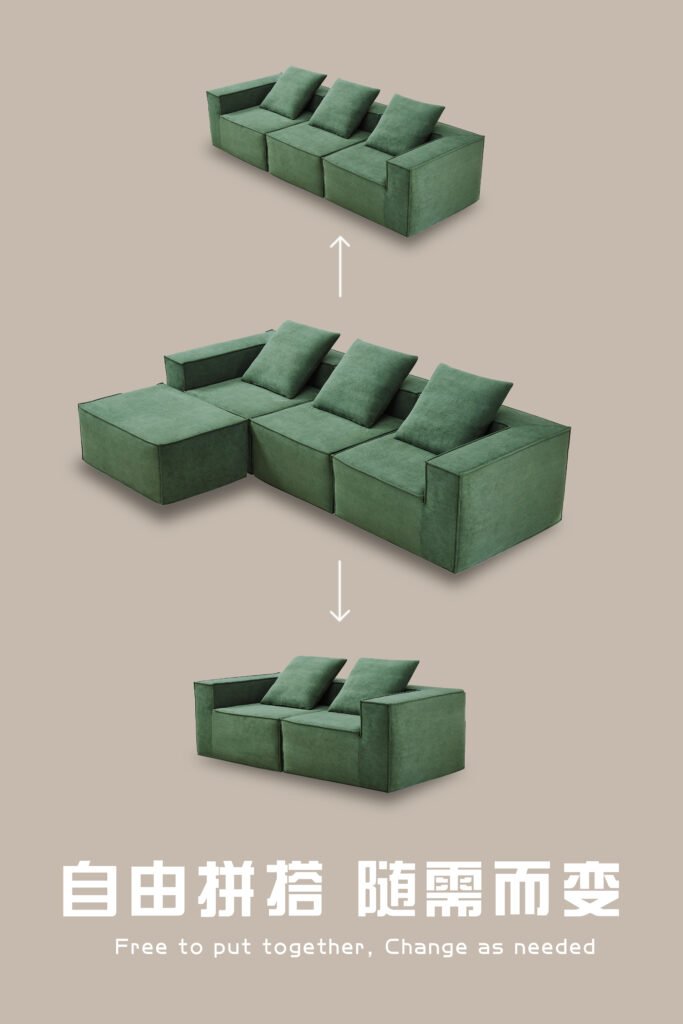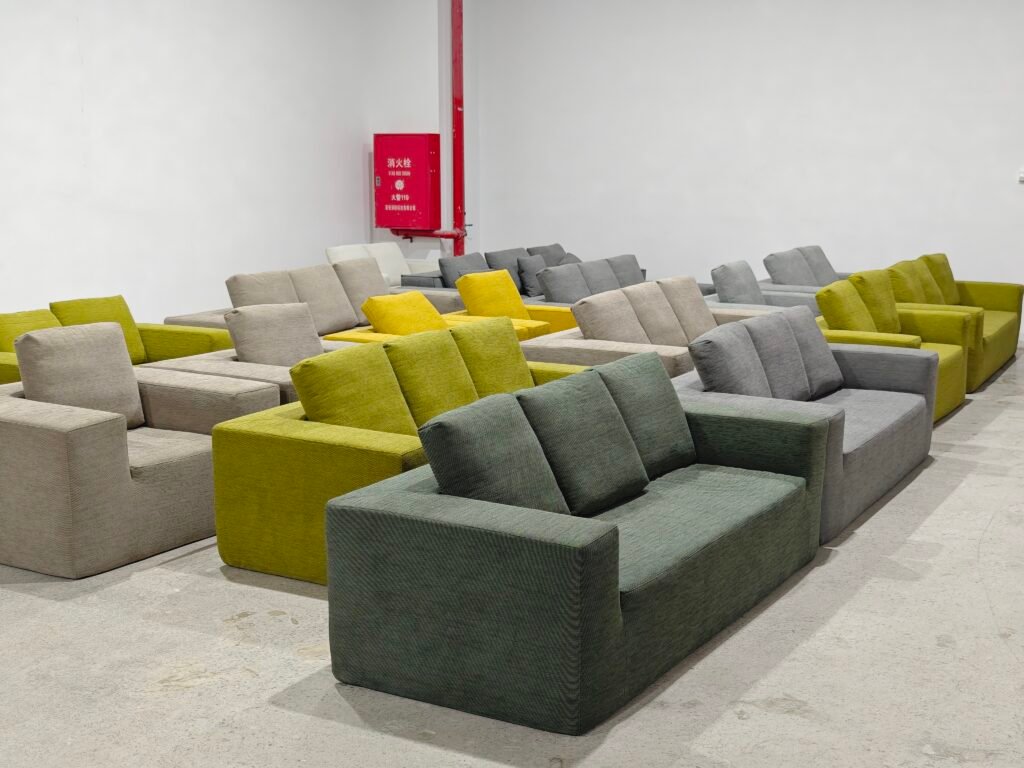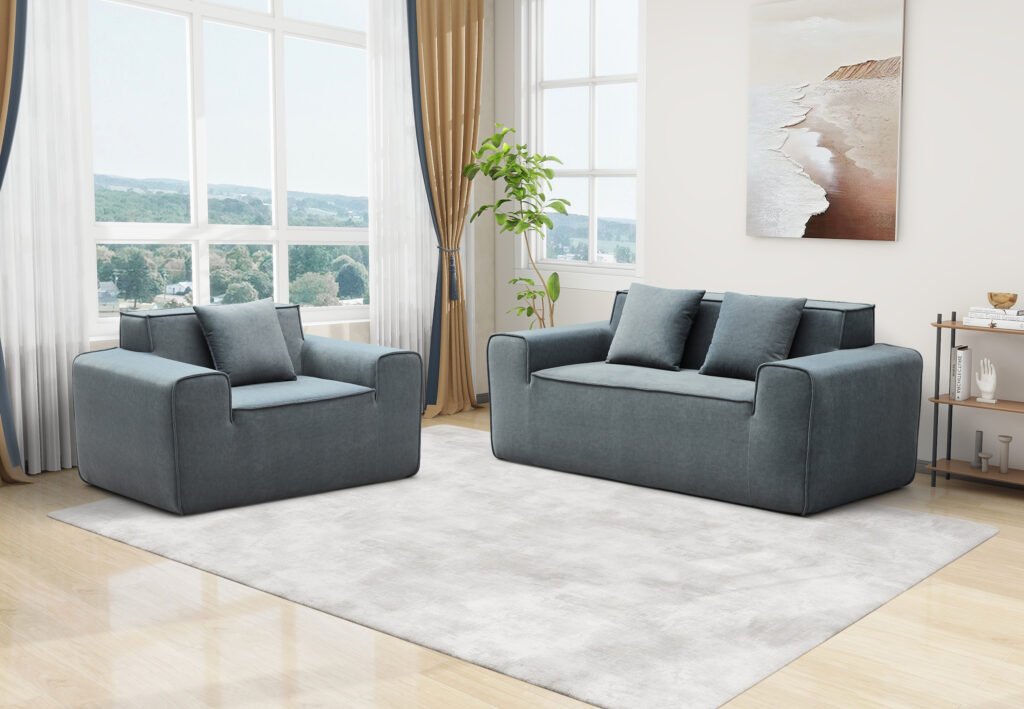Compressed sofas, also known as roll-packed or vacuum-packed sofas, have become a popular solution for space-saving furniture delivery and storage. These sofas are compressed tightly, vacuum-sealed, and rolled into compact packages to facilitate easier shipping and handling. However, a common concern among consumers is whether a compressed sofa loses its comfort if stored for an extended period before unpacking. This article delves deeply into this question, exploring the science behind compressed sofas, factors affecting comfort retention during storage, and practical advice for consumers. We will also highlight how Modular-Sofas.com offers durable, high-quality compressed sofas designed for long-lasting comfort.
What Is a Compressed Sofa?
A compressed sofa is a piece of furniture that has been tightly compressed using vacuum technology to reduce its size for shipping and storage. The sofa’s cushions, foam, and sometimes frame components are compressed and sealed in airtight plastic packaging, allowing the sofa to be rolled or boxed compactly. Upon unpacking, the sofa gradually expands to its original shape and size.
This innovative packaging method has revolutionized furniture logistics by reducing shipping costs, simplifying delivery, and enabling customers to receive large sofas in manageable packages.


How Does Compression Affect Sofa Comfort?
The comfort of a sofa primarily depends on the quality and resilience of its materials—especially the foam density, upholstery, and frame construction. Compression temporarily alters the shape and density of foam cushions by squeezing out air and compacting the material.
Key points about compression and comfort:
- High-Resilience Foam: Most compressed sofas use high-density, memory, or high-resilience foam designed to withstand compression without permanent damage.
- Temporary Compression Effects: Compression removes air from foam cells, making cushions feel firmer initially, but this is reversible.
- Expansion Period: After unpacking, foam cushions slowly regain air and elasticity, restoring softness and comfort within hours to days.
- Material Quality: Sofas made with inferior foam or cheap upholstery may not fully recover, leading to reduced comfort.
Does Storing a Compressed Sofa for a Long Time Affect Its Comfort?
Storing a compressed sofa for an extended period can raise concerns about whether the sofa will lose comfort or structural integrity. The answer depends on several factors:
1. Duration of Storage
- Short to Medium Term (Weeks to Months): Most high-quality compressed sofas maintain their ability to expand and regain comfort if stored properly for several weeks or months.
- Long Term (Several Months to Years): Prolonged storage may increase the risk of some foam degradation or permanent compression marks, especially if the sofa remains tightly sealed without any air exchange.
2. Storage Conditions
- Temperature: Extreme heat or cold can affect foam resilience. Heat may soften foam excessively, while cold can make it brittle.
- Humidity: High humidity can cause moisture buildup inside packaging, potentially damaging fabric or foam.
- Pressure: Storing other heavy items on top of the compressed sofa can cause deformation.
3. Quality of Materials
- Premium sofas with high-density, durable foam and strong upholstery are more likely to retain comfort after long storage.
- Lower-quality sofas may experience foam breakdown or fabric creasing.
4. Packaging Integrity
- Vacuum-sealed packaging protects the sofa but can also trap moisture if not stored properly.
- Damaged or leaking packaging can expose the sofa to dust, moisture, or pests.


Scientific Insights on Foam Compression and Recovery
Foam used in sofas is typically made of polyurethane or memory foam, which have elastic properties allowing them to compress and rebound. Research indicates:
- Elastic Recovery: High-quality foam can recover up to 90-100% of its original shape after compression.
- Compression Set: Prolonged compression can cause a “compression set,” where foam does not fully rebound, leading to permanent deformation.
- Time Factor: The longer foam remains compressed, the higher the chance of compression set, but this varies by foam type.
- Temperature Influence: Warmer temperatures can help foam recover faster, while cold slows recovery.
How Long Does It Take for a Compressed Sofa to Fully Expand?
Most compressed sofas expand to near-original size within 24 to 72 hours after unpacking, though full recovery of comfort and softness may take up to a week depending on:
- Foam type and density
- Room temperature and humidity
- Whether cushions are fluffed or rotated during expansion
Tips to Maintain Sofa Comfort After Long Storage
- Unpack Promptly: Remove packaging as soon as possible to allow air circulation.
- Warm Environment: Place the sofa in a warm room to facilitate foam rebound.
- Fluff Cushions: Regularly fluff and rotate cushions to redistribute foam and prevent uneven wear.
- Avoid Heavy Loads: Do not place heavy objects on the sofa during expansion.
- Check Packaging: Inspect packaging for damage before storage to avoid moisture or pest infiltration.
What if the Sofa Loses Comfort After Storage?
If a compressed sofa feels firmer or less comfortable after storage:
- Give It Time: Allow additional days for foam to regain elasticity.
- Use Cushions and Throws: Add soft cushions or throws to improve seating comfort.
- Contact Manufacturer: Reach out to the sofa supplier for advice or warranty claims if comfort loss persists.
Why Choose Modular-Sofas.com for Compressed Sofas?
At Modular-Sofas.com, we specialize in durable, high-quality compressed and modular sofas designed to maintain comfort even after extended storage. Our advantages include:
- Premium High-Density Foam: Engineered to withstand compression without permanent damage.
- Robust Vacuum Packaging: Protects sofas during shipping and storage.
- Modular Designs: Allow easy reconfiguration and maintenance.
- Customer Support: Guidance on unpacking, storage, and care to preserve comfort.
- Sustainable Materials: Eco-friendly and durable upholstery options.
Table: Factors Affecting Comfort of Compressed Sofas After Storage
| Factor | Impact on Comfort | Recommendations |
|---|---|---|
| Foam Quality | High-density foam retains shape better | Choose sofas with premium foam |
| Storage Duration | Longer storage may cause compression set | Avoid prolonged storage if possible |
| Temperature | Extreme heat/cold affects foam resilience | Store in stable, moderate temperature |
| Humidity | Moisture can damage foam and fabric | Store in dry environment |
| Packaging Integrity | Damaged packaging risks contamination | Inspect and repair packaging if needed |
| Expansion Time | Full comfort returns over days to a week | Allow sufficient time after unpacking |
| Handling During Storage | Heavy pressure causes deformation | Avoid stacking heavy objects on sofa |
Common Myths About Compressed Sofa Comfort Loss
- Myth: Compressed sofas lose all comfort after storage.
Fact: High-quality compressed sofas are designed to recover fully if stored properly. - Myth: You must unpack immediately or the sofa will be ruined.
Fact: While prompt unpacking is ideal, short to medium storage does not harm most sofas. - Myth: Compression damages foam permanently.
Fact: Modern foam is engineered for repeated compression and rebound.


How to Extend the Life and Comfort of Your Compressed Sofa
- Store in a climate-controlled, dry area.
- Avoid exposing the sofa to direct sunlight or moisture.
- Use protective covers during storage.
- Follow manufacturer care instructions.
- Rotate cushions regularly after unpacking.
Conclusion
A compressed sofa does not inherently lose comfort after being stored for a long time, provided it is made from high-quality materials and stored under proper conditions. While prolonged compression can increase the risk of foam degradation, most modern compressed sofas, such as those offered by Modular-Sofas.com, are designed to retain their comfort and durability even after extended storage.
Allowing sufficient expansion time and following recommended care practices will ensure your sofa remains comfortable and supportive for years. Choosing a reputable supplier with expertise in compression technology is key to enjoying the benefits of space-saving furniture without sacrificing comfort.